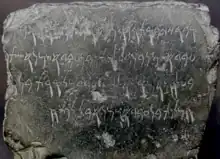
The Avignon Punic inscription
The Avignon Punic inscription is a Punic language inscription found in the Champfleury area of Quartier Ouest of Avignon in 1897, by a builder digging a trench 2-3 meters deep on the boundary of a property. It was first announced by Mayer Lambert.[1]
It is currently held at the Musée d'archéologie méditerranéenne in Marseilles. It is known as KAI 70 and RES 360
It is considered to originate from Carthage.
Inscription
(1) QBR ZYBQT HKHN[T L]RBT ... BT (This is the) grave of ZYBQT, the pries[tess of (the)] Lady... daughter of (2) ʿBDʾŠMN BN BʿLYTN BN ʿBDʾŠMN ʾŠT 'Abd-Eshmun, son of Baalyaton, son of 'Abd-Eshmun; wife of (3) BʿLḤNʾ MQM ʾL[M BN] ʿBDMLQRT BN Baalhanno, (the) servant (of the) go[ds, son of] 'Abd-Melqart, son of (4) ḤMLKT BN ʿBDʾŠMN ʾBL LPTḤ Himilco, son of 'Abd-Eshmun. Do not open this.
Gallery
Bibliography
- Berger Philippe. Annonce de la découverte d'une inscription phénicienne à Avignon. In: Comptes rendus des séances de l'Académie des Inscriptions et Belles-Lettres, 41e année, N. 6, 1897. p. 672. DOI : https://doi.org/10.3406/crai.1897.71073
- Clerc Michel. Note sur l'inscription phénicienne d'Avignon. In: Comptes rendus des séances de l'Académie des Inscriptions et Belles-Lettres, 42e année, N. 3, 1898. pp. 446-452. DOI : https://doi.org/10.3406/crai.1898.71205
References
- ↑ Berger Philippe. Annonce de la découverte d'une inscription phénicienne à Avignon. In: Comptes rendus des séances de l'Académie des Inscriptions et Belles-Lettres, 41e année, N. 6, 1897. p. 672. DOI : https://doi.org/10.3406/crai.1897.71073
External links
This article is issued from Wikipedia. The text is licensed under Creative Commons - Attribution - Sharealike. Additional terms may apply for the media files.



